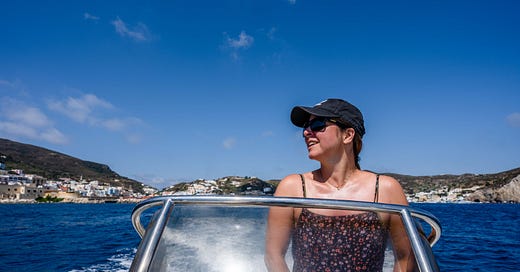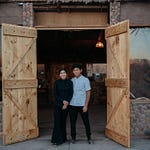Katie Parla is the New Jersey born, Rome based food writer, cookbook author, tour guide, podcast host and frequent television show guest for anything that happens to include Italy. I have been following her work for many years and it was really great to finally get to hear from her face to face. She has a new book out called Food of the Italian Islands: Recipes From the Sunbaked Beaches, Coastal Villages and Rolling Hillsides of Sicily, Sardinia and Beyond. It’s a beautiful book that covers both large, better-known islands and small off beat ones. They are very regional recipes and even if you have traveled a lot in Italy and she doesn’t shy away from things that traditional books on Italian food stay away from, like spleen sandwiches and horse meat. What is especially cool is that she started her own publishing company to put this out in the world. She didn’t have to rely on a literary agent or traditional publishers. She still had much of the team in place from her last book. So, the same editors, designers and photographer were all there, but she did it all herself and it looks beautiful. She’s even publishing a book with her imprint with the Los Angeles restaurant Angelini Osteria. As publishers lean more and more on the platforms of writers, self-publishing in this way is starting to make a lot more sense.
Did you know that you can also listen to the New Worlder podcast on Apple Podcasts, Spotify and most other podcast networks?
Episode Highlight
On Self Publishing
Nick: “Food of the Italian islands, that's your new book. “
Katie: “Dropped in March 2023.
Nick: “Did you self publish it?”
Katie: “I did. Parla publishing, established in New Jersey in 2022.”
Nick: “That's awesome. And this was your first time self publishing?”
Katie: “Yeah, my first title. I thought it was going to be super hard. I was mistaken. And I'm helping a restaurant in Los Angeles independently published their cookbook.”
Nick: “I saw that. Which restaurant is that?”
Katie: “It's Angelina in Los Angeles.”
Nick: “It’s classic?”
Katie: “Yeah, it's very classic. The owner Gino went to culinary school at age 13 in Rimini at the peak of the dolce era period, like served Fellini and then settled in Los Angeles 25 years ago. It does Italian regional cuisine, a lot of classics, but then also things that just kind of like rift on family traditions, but adapted to a California setting. And so, it's a cookbook that recounts the history of the restaurant. After doing Food of the Italian Islands, I was like, this is something that I can help other people do.”
Nick: “Is self publishing was that easy? I know lots of people have self published in the past, but your book looks as good as one from a major publisher. I think the quality of the design, the cover and everything, it looks beautiful. How much more did that process take out of you? I’m sure you've had lots of established relationships with publishers and agents.”
Katie: “I'm almost 10 years into cookbook writing. And Food of the Italian Islands was my seventh. So I had six very different experiences with three or four different publishers. I knew that I wanted to reassemble the team that had done Food of the Italian South. So, I simply hired Ed Andersen to shoot the book and Ian Dingman to design the book. I hired Emily Timberlake, who was at Ten Speed, I always wanted to work with her, she was the development editor. And then I hired the rest of the team, the copy editor, proofreader and index from my previous titles, and found a printer, how to print it. And the like most stressful thing was the logistics of moving a container of books from a printer in Italy, to a warehouse in New York.”
Aside from that, and now that I know how to do that, it's simple. It's literally just like a checklist of steps. I did go through all of the steps that you would in a traditional publishing setting that is, you submit your manuscript, it goes through development, edit, you update it, you send it to the copy editor, you update it based on their feedback, and so on. But I could tell my designer, he could do whatever he wanted, no marketing team would say, you know, blue isn't gonna fly on the cover. We don't do blue covers or whatever, or the fonts are too bold. We didn't, except for a couple of photos, which the ingredients were out of season, everything was shot in situ. That never has flown in another setting. It's always there's always some studio element to it.”
Nick: “I agree, I so want to do the books with documentary style photos and things. And it's never allowed. It drives me crazy. It's so much better.”
Katie: “I think that the look of the visual impact of the book is so superior to anything else that I've done, because I was free to let Anderson go wild. But yeah, I took a stack of books that I've written to the printer, and I go, ‘Can you do something of this quality?’ Like, no, that's actually shit. We're going to do a really good printing and a really cool binding. I got to see each stage of the process, you have to press like, go on the big printer, and that initiated a full month of printing. And then I saw them fold and cut and bind the books at the binder, the coolest ever. For the opaque foil that forms the black shadows on the letters, I saw that imprinted onto the book by a guy called Luigi who had to come out of retirement to work the machine. So, there were just so many cool, like artisanal aspects to it. You know this well. You send off a manuscript, and like it's all digital until you get the pages laid out. And then once you get your second pass, you are not involved in the process. I really wanted to see how hands on I could be at every step of the way. And it turns out, I could be 100% hands on, they probably wouldn't have let me ride in the container. But, I was there every step of the way. And it was amazing.”
Nick: “So what's the risk? I guess is you just had to upfront a lot of the costs.”
Katie: “Yeah, so that's a great question. I have access to analytics based on sales. And when you work for a corporate publisher, you have access to the back end, and you get your royalty statements. I knew what I could sell. For example, for Food of the Italian South, I sold a little over 30,000 copies in three years. So when I was looking at those numbers, I was like, Okay, well, I can sell 10,000 through unconventional methods, by my website, and just indie bookstores in three years. I did all the production costs, logistics costs, storage of the book, at the warehouse, boxes for sending it out all that stuff. If I sold 5500 books of direct sales through a website and then wholesale distribution I would break even. I also had negotiated with my printer to pay in installments. I actually just paid down my last installment for books. So, the upfront costs, were not the full production costs, and I covered almost all of them through just presales.”
Nick: “That's amazing.”
Katie: “I'm stoked. I'm very happy about this. I like to make money from writing books. And that's never happened to me.”
Nick: “I feel like the publishers now depends so much on your own platform that it's like, do we even need you anymore?”
Katie: “The number of times I asked for just very basic support during self funded book tours. And I heard, we're with Chrissy right now. And I'm like, first of all, jelly. Second of all, I just need a little tiny bit of help. And I get that you're with a celebrity author, ut I'm not one and I'm doing so much work, and I'm selling the shit out of this book. Like, please just send me one thing, that I one graphic that I need, like, please. So, they're depending on you, and then actually withholding basic support, which is fucked, honestly.”
Nick: “It's like, what do they even do anymore? They're doing less and less for you. And it's so much on yourself to do everything now that cutting some of the people out makes a lot of sense.”
Katie: “It's so devastating on your free time, mental health, bathing schedule, just to make the book. And then to have the responsibility of marketing and promoting it without just really basic support is very, very upsetting. It’s another one of the reasons that Parla Publishing was born is because I have made every mistake. I've learned every lesson, at least hopefully. I have developed over the time insight and skills into how to how to promote a book and make it profitable. I'm doing a 4 city book tour in August. So a very conservative number of cities. And I will make real money, taking my book on tour. I can cover my travel expenses. I can make it worth my while not doing tours for the week in Rome. I can stay in a hotel and maybe get like a massage, like things that things that you really need when you're on that tour grind. I want other people to be able to do that for themselves as well.”
Nick: “That sounds lovely.”
Katie: “Massages for all.”














Share this post